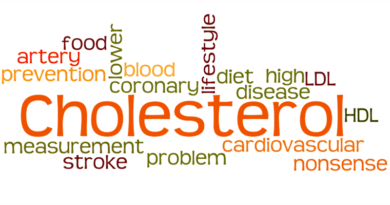Benecol vs Butter
The ingredients in Benecol Olive spread are: Water, Rapeseed oil, Olive oil, Plant stanol ester (plant stanol 7%), Vegetable oil, Buttermilk powder, Salt (0.9%), Emulsifiers (mono- and diglycerides of fatty acids, soya lecithins), Preservative (potassium sorbate), Acidity regulator (citric acid), Flavorings, Vitamin A, Color (carotenes), Vitamin D.
The ingredients in butter are: butter.
Which one do you think nature intends you to eat?!




I am surprised you take such a simplistic view on Butter. I speak with a gastroenterologist on a quarterly basis, and he doesn’t eat any diary products. His rationale is that we were never designed to consume milk or associated dairy products from another animal. No other species or category of species does the same. Dairy products (with the exception of yoghurt perhaps) cause many gastrointestinal issues.
Hi Sanjay
I reviewed this topic extensively in 2012 (https://www.zoeharcombe.com/2012/03/dairy-to-eat-it-or-not-to-eat-it-thats-the-question/). Lactose intolerance varies greatly with ethnicity so some populations are wise to avoid dairy – others not so. Among northern Europeans, lactose intolerance is c. 5% and there are far too many nutrients in dairy foods (B vitamins, vit D, calcium, phosphorus especially) for us to avoid this whole food group without good reason.
I’ve heard the other species argument before and it’s simply not true. Give a cat milk or cream (or cheese) and it will lap it up. Dogs the same. Carnivores or omnivores will consume dairy given the chance. There just isn’t a Tesco or Walmart in the wild for them to get it!
Best wishes – Zoe
In answer to your question, I would say neither. Nature doesn’t intend you to eat chemicals just as it doesn’t intend you to consume milk meant for another species.
I have been using Benecol Olive spread for a few years to lower my cholesterol. My cholesterol was still too high so my doctor prescribed statins. My cholesterol came right down so I thought that I would stop using Benecol as the statins were doing their job. Subsequently I chose to substitute Benecol for butter, which I use on breakfast toast (1 slice) and sometimes a sandwich mid-day. I found that butter, probably because I was not used to it, upset my stomach, I felt quite nauseous and got the feeling it was too ‘fatty and rich’ for me. I have subsequently reverted back to to Benecol, I think the olive in it is good for me. I feel slightly uneasy as I don’t need the sterols anymore and could I be ‘overdosing’ as I am on statins.
Hi Pat
This is what you’re doing https://www.zoeharcombe.com/2014/05/replacing-not-lowering-cholesterol-would-be-more-accurate/
You may find these interesting too:
https://www.zoeharcombe.com/2013/10/how-statin-drugs-really-lower-cholesterol-and-kill-you-one-cell-at-a-time/
and
https://www.zoeharcombe.com/2010/11/cholesterol-heart-disease-there-is-a-relationship-but-its-not-what-you-think/
Best wishes – Zoe
It has palm oil in it
Hi
It so re-assuring to see your comments and analysis of the products marketed (at great expense) that lower your cholesterol. The problem with eating butter is that we eat too much of it and so many foods contain the bad fats = high levels. We need some cholesterol and it just needs moderation and balance. All these fancy margarines (that is what they are) are synthesised and not so good! Thank goodness there are people who see beyond the hype! Why can’t plant stenols be given to us in butter????
Hi Sandy – keep reading – you need to go even further than you already have! Here is why we never want to lower cholesterol (https://www.zoeharcombe.com/2010/11/cholesterol-heart-disease-%E2%80%93-there-is-a-relationship-but-it%E2%80%99s-not-what-you-think/) and here is why we never want to consume plant sterols (https://www.zoeharcombe.com/2013/01/the-british-heart-foundation-flora-pro-activ-an-unhealthy-relationship/)
Best wishes – Zoe
Does benecol contain hydrogenated fats?
Hi Chris – Just looking at the 3 Benecol spread products here – they all declare trans fats (http://benecol.co.uk/our-food-range/spreads) in the ingredients. To make liquid oils solid at room temperature hydrogenation or some similar process needs to take place. If you know the structure of fats – saturated fats are fully saturated with hydrogen atoms and hence these fats are solid at room temperature. These are the most stable fats (chemical fact) and the safest therefore to cook with. To make unsaturated fat (liquid at room (mono) or fridge temperature (poly)) solid at room temperature they need to solidify the liquids in some way. Firing hydrogen atoms in at great heat is the process of hydrogenation making trans fats.
So – yes – Benecol contains hydrogenated fats, as well as having been (some or all of) heat treated, bleached, deodorized, emulsified, coloured and goodness knows what else they do to this hideous gunge!
Best wishes – Zoe
Hi Zoe
I dont understand why you would say the omelette recipe is dairy free when it is clearly made with butter? Help!
Hi there – I shouted “Yes” when I saw your comment! This is exactly what we should be teaching children from primary level. As young as 3-5 children can learn where real food comes from – milk comes out of the cow, sugared milkshakes don’t; baked potatoes come out of the ground, crisps don’t; fish swim in the sea, fish fingers don’t. They would get it in no time and have the understanding for life.
I know a great journalist who only lets her children put things in the trolley that have 5 ingredients or fewer! Brilliant!
A great TV producer lets her child have ‘1 bad thing’ a day – so he makes the choice between a fizzy drink or a confectionery bar and he grows up thinking of both as bad – in no way ‘treats’.
I analysed just 4 government campaigns (FSA, NHS, Dept of Health and the British Nutrition Foundation) and there are 18 different ‘healthy eating’ messages across the 4 sets of advice – 12 are not repeated (unique to 1 campaign) and only one message is repeated in all sets of advice (activity – not even about food, but about trying to burn off food), but the words even for activity differ in every campaign.
We need to tear up every one of these campaigns and get rid of all the Eatwell plates (see http://theharcombediet.com/research/statistics/ for how much carbohydrate this drives us to eat) and have just one message from cradle to grave:
“EAT REAL FOOD”! Nature knows best – not the FSA!
I am researching health and fitness in children and teh sorts of things we should be teaching them at Primary level. Surely this is the kind of obvious approach we shoud be taking – encouranging children to understand the importance of eating natural and ‘real’ food!